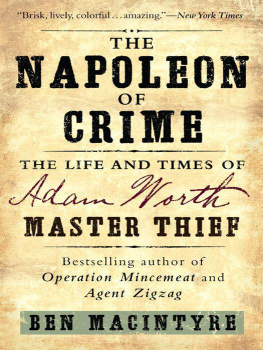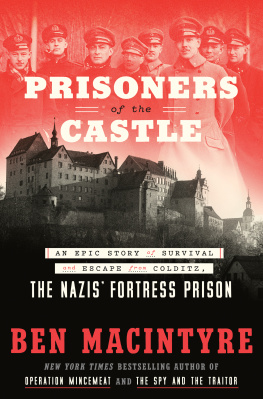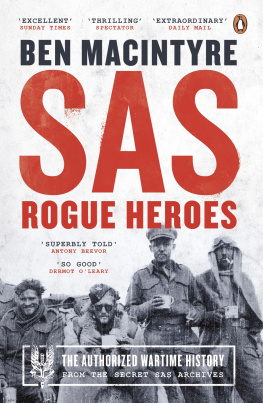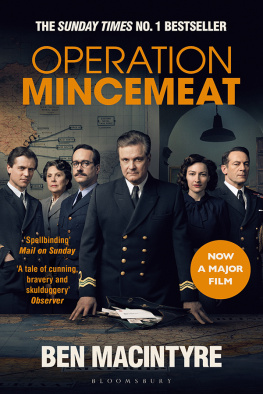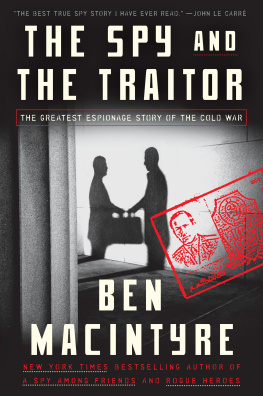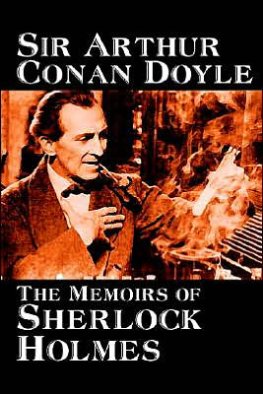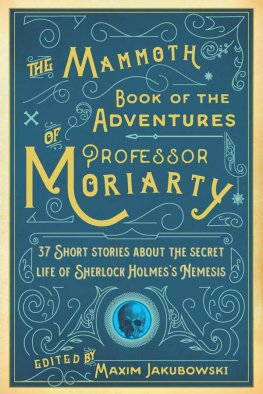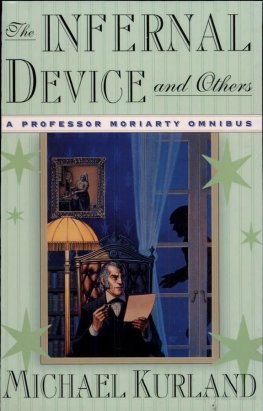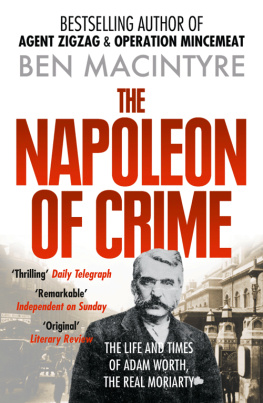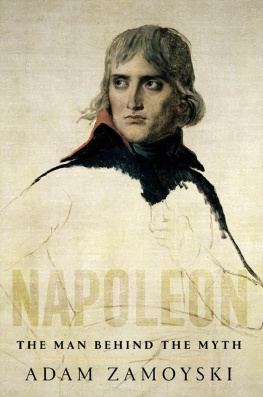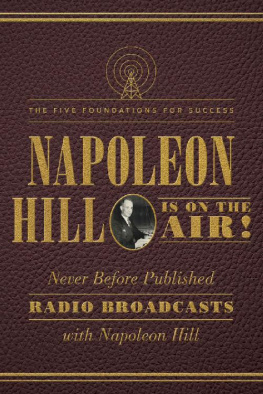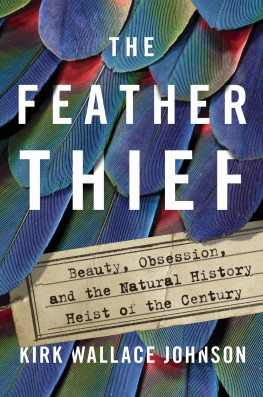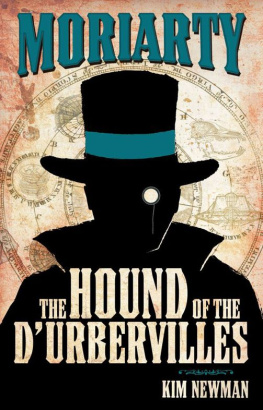Praise for
The Napoleon of Crime Adam Worth, the greatest thief of the 19th century, could have furnished the basis of a great novel. No need though: in The Napoleon of Crime , Ben Macintyre has given him a biography that reads like one. Los Angeles Times Book Review Entertaining This true-crime drama is as interesting for the personalities it captures as for the capers it dissects. Newsday A carefully researched and smoothly narrated tale. Washington Post Compelling. USA Today Giving new meaning to the term art appreciation, Ben Macintyres biography of Adam Worth could not be more imaginative, riveting, adventurous, or poignant if it were a work of fiction. Macintyre masterfully shows up the hypocrisy of Victorian society. Time Out New York Engaging. Atlantic Monthly Meticulously researched this finely crafted, often entertaining account ultimately captures its subject. The Sun [UK]Delightful, gripping, touching, exotic, people with highly colorful characters and written with humor and brilliant polish.James Lord, author of Some Remarkable Men I wish, from this day forward, that everything I learn about history could be channeled through Ben Macintyres brilliant sensibility and elegant voice. The Napoleon of Crime is a joy and a revelation to read.Robert Olen ButlerA fascinating tale faultlessly told thoroughly enjoyable.Eric Zencey, author of Panama A good deal more thrilling than most thrillers. Daily Telegraph [UK]A most remarkable and entertaining biography. It is a highly charged thriller, a moving love affair, a dramatic history of the Victorian criminal underworld, a noble tragedy. Independent on Sunday [UK][A] vastly entertaining saga the ingenious details of his most memorable heists are hilariously recounted in a comic fashion by an author who expresses genuine affection and admiration for his flawed subject. This fascinating and amusing biography will delight true-crime buffs. Booklist Macintyre has composed a portrait as spiced with wit as its subject is colorful. Publishers Weekly ALSO BY
Ben Macintyre Operation Mincemeat
How a Dead Man and a Bizarre Plan Fooled the Nazis
and Assured an Allied Victory Agent Zigzag
A True Story of Nazi Espionage, Love, and Betrayal The Man Who Would Be King
The First American in Afghanistan The Englishmans Daughter
A True Story of Love and Betrayal in World War I Forgotten Fatherland
The True Story of Nietzsches Sister and Her Lost Aryan Colony



Grateful acknowledgment is made to the following for permission to reprint previously published material: Photographs of William Pinkerton, Adam Worth, Charles Bullard, Charles Becker, Max Shinburn, and Henne Alonzo courtesy of Pinkertons, Inc. Photographs of Kitty Flynn courtesy of Katharine Sanford. Excerpts from Macavity the Mystery Cat by T.S. Eliot, from Old Possums Book of Practical Cats, with permission of Harcourt, Brace & Co. Excerpts from Macavity the Mystery Cat by T.S. Eliot reprinted in Canada with permission of Faber & Faber. Copyright 1939 by T.S. Eliot, renewed by Esme Valerie Eliot.
Copyright 1997 by Ben Macintyre
Excerpt from Operation Mincemeat copyright 2010 by Ben Macintyre
All rights reserved.
Published in the United States by Broadway Paperbacks, an imprint of the Crown Publishing Group, a division of Random House, Inc., New York.
www.crownpublishing.com
Broadway Paperbacks and its logo, a letter B bisected on the diagonal, are trademarks of Random House, Inc.
Originally published in hardcover in Great Britain by Harper Collins Publishers, London, and in hardcover in the United States by Farrar, Straus, & Giroux, New York, in 1997, and in paperback in the United States by Delta, a division of Random House, Inc., New York, in 1998.
Cataloging-in-Publication data is on file with the Library of Congress.
eISBN: 978-0-307-88647-7
v3.1
For Kate
Preface
I had come to Los Angeles to cover the latest installment in the Rodney King case, that grimly defining saga of modern times. But I left the city with a very different tale of cops and robbers.
The white Los Angeles policemen who had been filmed by an amateur cameraman beating up a black motorist were in court for a second time, stolidly proclaiming their innocence. It was confidently predicted that the city was on the verge of another riot. One afternoon, when the jury had retired to consider its verdict, I decided to drive out to the suburb of Van Nuys to explore the archives of the Pinkerton Detective Agency, thinking I might write an article for The Times about American law enforcement in another, sepia-tinted age, a world away from the thugs on trial downtown, or those in the ghetto who would take to the streets if they escaped justice again.
The Pinkertons. The name itself summoned up hard lawmen with comic facial hair and six-shooters, riding out after the likes of Jesse James, the Reno gang, Butch Cassidy and the Sundance Kid. Shown into the basement archive by a bored secretary popping bubble gum, I immediately realized there was far more here than could possibly be digested in a year, let alone an afternoon. The rows of cabinets literally overflowed with files, a testament to the painstaking methods of Americas earliest detectives. After an hour or so of random delving, I picked up a bound scrapbook, dated 1902. Leafing through it, I came across this fragment of newsprint:

T his is the story of Adam Worth. If a fiction writer could conceive such a story, he might well hesitate to write it for fear of being accused of using the wildly improbable.
The sober, cold, technical judgment passed upon Adam Worth by the greatest thief-hunters of America and Great Britain is that he was the most remarkable, most successful and most dangerous professional criminal ever known to modern times.
Adam Worth, in a life of crime covering almost half a century, looted at least $2,000,000, and most probably as much as $3,000,000.
He cruised through the Mediterranean on a steam yacht with a crew of 20 men, and left a trail of looted cities behind him.
He was caught only once, and then through a blunder by a stupid confederate.
He ruled the shrewdest criminals, and planned deeds for them with craft that bade defiance to the best detective talent in the world.
The police of America and Europe were eager to take him for years, and for years he perpetrated every form of theftcheck-forging, swindling, larceny, safe-cracking, diamond robbery, mail robbery, burglary of every degree, hold-ups on the road and bank robberyunder their very noses with complete immunity.
There were three redeeming features in the life of this lost human creature.
He worshiped his family and regarded and treated his loved ones as something sacred. His wife never knew that he was a criminal. His children are living in the United States today in complete ignorance of the fact that their father was the master-thief of the civilized world.
He never was guilty of violence, and would have nothing to do under any circumstances with any one who did.
He never forsook a friend or accomplice.
Because of that loyalty he once rescued his band of forgers from a Turkish prison and then from Greek brigands, reducing himself to beggary to do it.
Because of that loyalty he became The Man Who Stole the Gainsborough.
Next page
